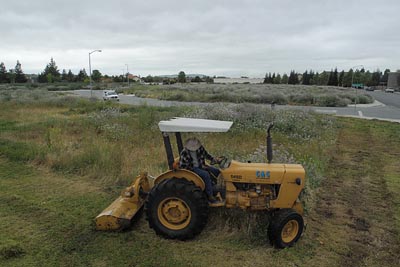More than 300 local property owners were told to clean up their
lots or risk incurring a lien as the city of Hollister conducts its
annual weed abatement program. The process starts with a courtesy
notice sent in March, after fire Capt. Michael O’Connor surveys
private- and publicly-owned properties throughout the city.
Property owners, ranging from private citizens to public agencies,
then receive a notice to clear weeds within 15 days after the city
council approves its
”
seasonal nuisance
”
list, which this year included 332 properties.
More than 300 local property owners were told to clean up their lots or risk incurring a lien as the city of Hollister conducts its annual weed abatement program.
The process starts with a courtesy notice sent in March, after fire Capt. Michael O’Connor surveys private- and publicly-owned properties throughout the city. Property owners, ranging from private citizens to public agencies, then receive a notice to clear weeds within 15 days after the city council approves its “seasonal nuisance” list, which this year included 332 properties.
“The weeds are worse this year but the amount of lots we have to disk is the same,” O’Connor said, noting optimal growing conditions because of the abundant rain.
Foreclosures have also prompted a number of lots to become overgrown in recent years, but the city’s code enforcement officers “have been doing a good job with keeping the weeds down” by sending notices to banks or homeowners threatening a fine, O’Connor said.
Although property owners are told to clean their lots within 15 days of receiving a notice during the annual weed abatement effort, the city does provide “a little leeway” if rainy conditions persist during that time, “though we try to hold those lines pretty close,” O’Connor said.
In addition to being an eyesore, overgrown lots can become a fire hazard and they are also a prime spot for illegal dumping.
“We want to beautify the city,” he said. “There are weeds growing over sidewalks that become tripping and fire hazards.”
After the 15-day abatement period, O’Connor checks all of the properties again and creates a list of non-compliant property owners whose names are forwarded to the city council. Once reviewed at a public hearing, that list is forwarded to a private contractor that removes the weeds for a fee. In most years, the contractors charge approximately $10,000 for the entirety of their work.
For the full story see the Pinnacle on Friday.










